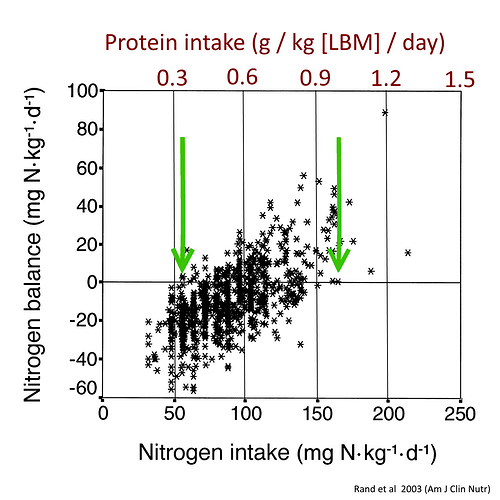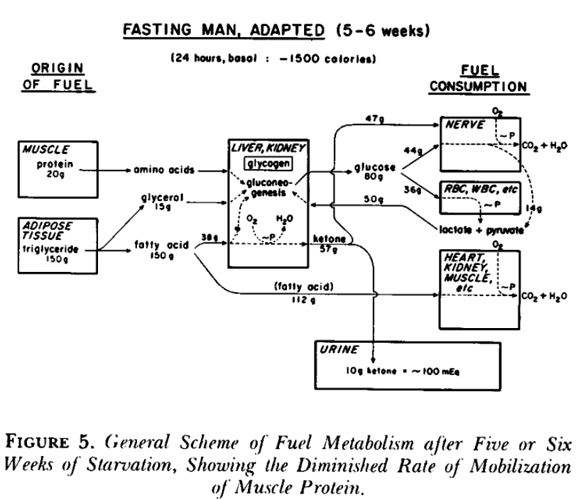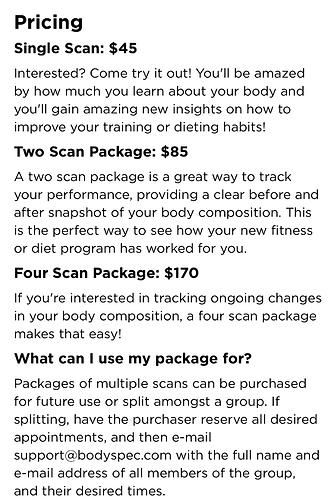So less protein for weight loss and more for body building?
We need MUCH less protein that we've been told
I agree with the general idea that we need MUCH less protein than we’ve been told - if we’re fat-adapted and especially if we’re not young males, breastfeeding or pregnant women, elderly, or hyped hypertrophic bodybuilders.
Our DNA is encoded for navigating between feasting & fasting… as long as we’re fat-adapted (and getting to 100% restored fat adaptation capacity can many months and sometimes up to two years for some individuals’ metabolic healing though, as per Phinney & Volek).
The good physicians Drs. Mary Dan Eades & Michael Eades were advocating LCHF and teaching about moderate protein vs. high protein decades ago - they call moderate levels of it “protein power” and wrote a book by that name.
Also, the phenomena of fat-adapted fasting is muscle-sparing - and reduces the protein need. OMAD requires less protein than 3 meals a day apparently - as explained by Dr. Berg (along with his urging folks to eat 10 cups of greens with their one meal - which is not only very expensive to buy or time consuming to gather from local fields - it doesn’t jive with the reality that traditional peoples relied way more on organ meats and bone broth than huge amounts of greens everyday. But I digress).
Then there’s the fact that certain proteins are absorbed very slowly and others are processed fairly quickly, depending on one’s enzyme levels and/or type of protein. Meaning that raw egg yolk and sushi fish transform fast - and an overcooked leathery steak in a low enzyme gut might take 24+ hours.
Have recently been learning about the dual-actions of protein absorption, relating to the infusion of amino acids into the bloodstream and protein synthesis, relating to the use of those amino acids to build tissues. Modern fast food keto vs. less industrial keto comes into play here, as to whether one regularly eats organ meats and/or superfood berries (wolfberries, blueberries, acai) that facilitate collagen synthesis (due to Vit. C apparently).
And have also been pondering the demographics stuff related to age, sex, stress levels. Many here already know about how this this study says it that ideally, each time we eat protein, we would eat at least 20 grams. It found that 20 grams of post-workout protein stimulated maximum protein synthesis in young men. But young men are a limited demographic for humanity!
So a synthesis on protein synthesis would integrate these factors:
How much muscle do you have? The more you have, the more amino acids your body needs to maintain your musculature, and the more places your body can store surpluses. “Bodybuilders” creating & maintaining high to extreme hypertrophy are different sorts of peoples…
Do you have much weight-bearing activity (weekly resistance training, or frequent lifting of toddlers)? Do you work a deskjob or do you work for a moving company or are you a permaculture farmer? The more you move around, the more protein your body needs.
What’s your chronological/hormonal age? Apparently the elderly (65 and older) need more protein to maintain muscle than midlife folks do. And younger females in premature surgical/chemical menopause as well as older females in natural midlife may need less protein than midlife males do, due to metabolic changes. And… a new study by Matthew Piper, a research fellow at Monash University, in Melbourne urges that too much protein in midlife can actually shorten your life! (But… the research is all on fruit flies, so… I dunno. I find it much more compelling to study the moderation & fasting habits of historic long-living people, such as what ketogenic scholar Christ Vlad does in his collection of research in the fab book Periodic Fasting: Repair your DNA, Grow Younger, and Learn to Appreciate your Food)
What’s your hormonal state? If you’re doing resistance training and/or have a strong metabolism for whatever reason, elevated levels of growth hormone and insulin-like growth factor 1 (IGF-1) stimulate muscle synthesis. If your body has high levels of these anabolic hormones, it will utilize protein better than someone that has low levels. Buuuuut… if you’ve got elevated levels of cortisol because you’re managing a ton of stress (and possibly exacerbating it rather than improving it through physical stress) it reduces protein synthesis/metabolism.
Are you IR? If so, after full fat-adaptation (whenever that is reached) reducing the frequency of protein intake reduces insulin spikes and empowers more efficient fat burning.
Protein isn’t the issue!! Stop being afraid of protein because it is “stimulates insulin” - it’s the INSULIN CURVE that counts! Protein creates the most smooth, natural Insulin curve that’s healthy. Insulin isn’t the enemy. It’s what your body needs to absorb nutrients and build itself!
The DEMONIZATION of mTOR by the “Keto & Vegan Experts” looks a lot like how the Medical ESTABLISHMENT & Big Pharma painted “Cholesterol” as the boogyman!
When basic common sense applied to knowledge should tell them otherwise.
“The mammalian target of rapamycin (mTOR) signaling pathway integrates both intracellular and extracellular signals and serves as a central regulator of cell metabolism, growth, proliferation and survival.”
OH MY GOD!!! THEY SAID CELL SURVIVAL & GROWTH IN THE SAME SENTENCE, WHICH MEANS… “AFTER GIANT ASSUMPTIVE LEAP” … CANCER!!!
Errr, hold up. Isn’t mTOR (just like Cholesterol) a natural, fundamental part of the human biology with a CRITICAL ROLE to play in cell metabolism??? And you want to SUPPRESS it (like the Cholesterol, FAT & statins fiasco) by cutting back on protien in the diet?
And CANCER because of protein? And not because of the other gazillion crappy, UNNATURAL, industrial foods & chemicals, toxic oxidised oils, processed sugars & trans fats that’s dumped into the body? Not to mention overcooking meats (often full of Nitrates) with oxidised oils at high heat and truly turning healthy plates of food into cancerous madness! REALLY? What a freaking JOKE!
It seems like not only do we NEVER learn from past mistakes, the “so called EXPERTS” are the chief culprits in creating NEW red herrings… instead of EATING IT!
I would say the enemy is multifactorial - namely metabolic disease due to industrial diets, along with muscular atrophy due to sedentary lives, and excess economic privilege that makes it possible to discuss levels of protein compared to the one billion who are starving.
mTOR pathways are not a monolithic thing functionality-wise and Keto is not one-size-fits-all though - body recomposition is processes within processes, no? The more fat-adapted one is (and it can take a year or more to get to 100%) the more efficient everything is. Many midlife women find that actual body recomposition lipolysis is facilitated through a much lower daily intake of protein (around 45-60g total) along with random Intermittent Fasting - as discussed in various places here and in some online articles.
I do think that acknowledging biological realities like age, sex, and the extent of metabolic derangement - and how that relates to energy intensive animal protein is on the side of the angels rather than the demons 
but a combination of IF/EF Keto WOE (it’s flexibility) is as close to one-size-fits-all tool as we probably will ever get 



Definitely! Flexibility is like… elastic HAHAhaaa
Fasting & Feasting flexibility is truly amazing - as well as the fact that the body stays agile with randomness. I love the freedom I feel to be able to adjust my food practices according to what’s happening cortisol-wise/stress management-wise - and for randomness to work… as seen in body measurements and other NSVs 



Other than a DEXA, what are the other options to get LBM reading?..Perhaps a basic newbie question 
Planning on getting a DEXA scan soon as well.
BTW , does the $45 per scan sound about right?
That’s what I was checking on now as well
Thanks
The most smooth, natural, healthy?
That’s a lot of marketing weasel words. Are you selling hair products?
That is a strawman argument, as is the argument that excess protein will drive GNG and knock you out of ketosis, or that a steak could become a chocolate cake. The reason most people who don’t have Cancer or Diabetes limit protein is because it’s a waste to use protein for energy.
Don’t get me wrong. Protein is, of course, essential for life, and adequate protein to support lean tissue turnover essential for a long health span - humans need between 0.3 and 1.0 g/kg LBM for that.
Beyond that, those of us not eating glucose may need an extra 20g extra a day to supplement our brains obligate glucose requirement (people who are overweight yet active will need much less).
Every gram in excess of that need is deaminated, and lays around as metabolic raw materials waiting to be eventually wasted for energy. That defrays our use of fat for energy and all the benefits that accrues. Eat enough protein and you don’t make ketones, and now you need to make a LOT more glucose and that will use even more protein - either protein from your plate, or protein from that bicep you made in the gym last year. Eat too much protein and now you are running up against your bodies limit to dispose of the nitrogenous and sulphurous waste products.
I know of at least 2 young women who died from ammonia intoxication due to eating too much protein because they were told there is no upper limit by the church of “eat moar proteinz”, and they pounded as much whey as they could to cut their pre-comp body fat … and as doctors learned at their autopsies they ended up pounding more protein than they could. The first case was a paramedic in Western Australia, the second a student in Arizona and that one was particularly sad because her liver was donated and the organ killed it’s recipient as well.
As for diabetics, we have been awash in insulin for 20 years pre-diagnosis and are losing body parts from the disseminated vascular disease that has caused … less insulin is a primary goal (before weight loss), once glucose is under control. So if there are no reasons why we have to eat moar proteinz, we’re not going to.
As for people with Cancer, raising Insulin, raising MTOR, and lowering AMPK are primary nutrients signals that tell tumors to grow. Low carb diets lower Insulin, Ketogenic diets lower both Insulin and MTOR - both are sustainable long term. Fasting will affect all 3, but while you can’t fast all the time … you can do so in bursts. You can hear more about THAT strategy used to successfully treat Colo-rectal cancer in
Everybody’s different obviously but I’m in the gym 5x a week last couple weeks, and I was running a 4x week for the previous probably 4 months before that. I’m running around the 1.5g mark. At that point I’m not having any of the side effects of too much protein which used to hit me pretty hard and pretty fast. Mainly couldn’t sleep, waking up in a sweat etc. The harder I’m in the gym the more protein I can take without it backfiring. I went from 300 to 200 and didn’t put lifting in the mix till around the 240-250 mark and since that I’ve pretty descent visual gains without much weight loss so it’s not a fat coming off of what I already had thing. I’m strongly considering starting one of Jim Stoppani’s programs next week and may play with the idea of pushing past that, gonna take this week to figure out how to change his nutritional end of it to work with keto.
If you have a way to determine you body fat % your LBM is the rest of your weight. Also a $45 DEXA is about HALF what I’ve been quoted. Thats cheap.
Thank You!
Really? Cool then . Yeah. That was on the company site for the DEXA
I’m In CA.
DEXA Scan Info
Wanted to share 
They also offer RMR Testing ( resting metabolic rate )
$75
"I would start at at least 1g/kg LBM, see how you feel and then n=1 up and/or down and see what happens. "
This actually reminds me of something I’ve been curious of: are there signs/symptoms of too little protein?
And muscle loss, weakness (marginal changes rather than becoming floppy  ), slow healing etc. though it would be harder to see these unless you were more than a little under your body’s threshold
), slow healing etc. though it would be harder to see these unless you were more than a little under your body’s threshold
Funny how a 4 scan package offers no financial or functional benefit over a 2 scan? Still - a killer rate!
Your post was so fascinating I decided to download the book you recommended. Starting it now. Thanks for your insightful message and musings.



